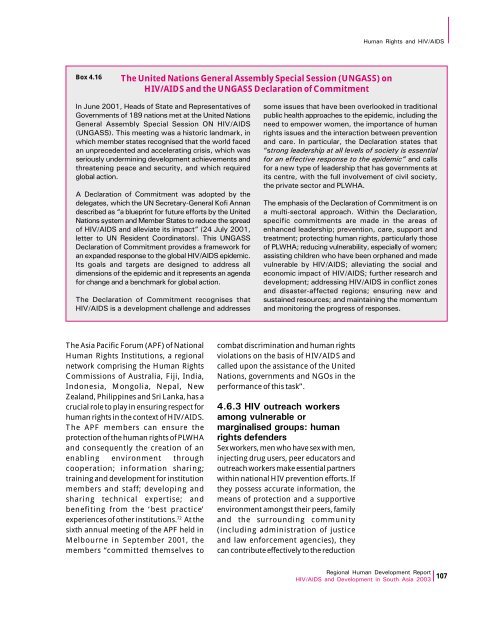Download Report - UNDP Asia-Pacific Regional Centre - United ...
Download Report - UNDP Asia-Pacific Regional Centre - United ...
Download Report - UNDP Asia-Pacific Regional Centre - United ...
Create successful ePaper yourself
Turn your PDF publications into a flip-book with our unique Google optimized e-Paper software.
Human Rights and HIV/AIDSBox 4.16The <strong>United</strong> Nations General Assembly Special Session (UNGASS) onHIV/AIDS and the UNGASS Declaration of CommitmentIn June 2001, Heads of State and Representatives ofGovernments of 189 nations met at the <strong>United</strong> NationsGeneral Assembly Special Session ON HIV/AIDS(UNGASS). This meeting was a historic landmark, inwhich member states recognised that the world facedan unprecedented and accelerating crisis, which wasseriously undermining development achievements andthreatening peace and security, and which requiredglobal action.A Declaration of Commitment was adopted by thedelegates, which the UN Secretary-General Kofi Annandescribed as “a blueprint for future efforts by the <strong>United</strong>Nations system and Member States to reduce the spreadof HIV/AIDS and alleviate its impact” (24 July 2001,letter to UN Resident Coordinators). This UNGASSDeclaration of Commitment provides a framework foran expanded response to the global HIV/AIDS epidemic.Its goals and targets are designed to address alldimensions of the epidemic and it represents an agendafor change and a benchmark for global action.The Declaration of Commitment recognises thatHIV/AIDS is a development challenge and addressessome issues that have been overlooked in traditionalpublic health approaches to the epidemic, including theneed to empower women, the importance of humanrights issues and the interaction between preventionand care. In particular, the Declaration states that“strong leadership at all levels of society is essentialfor an effective response to the epidemic” and callsfor a new type of leadership that has governments atits centre, with the full involvement of civil society,the private sector and PLWHA.The emphasis of the Declaration of Commitment is ona multi-sectoral approach. Within the Declaration,specific commitments are made in the areas ofenhanced leadership; prevention, care, support andtreatment; protecting human rights, particularly thoseof PLWHA; reducing vulnerability, especially of women;assisting children who have been orphaned and madevulnerable by HIV/AIDS; alleviating the social andeconomic impact of HIV/AIDS; further research anddevelopment; addressing HIV/AIDS in conflict zonesand disaster-affected regions; ensuring new andsustained resources; and maintaining the momentumand monitoring the progress of responses.The <strong>Asia</strong> <strong>Pacific</strong> Forum (APF) of NationalHuman Rights Institutions, a regionalnetwork comprising the Human RightsCommissions of Australia, Fiji, India,Indonesia, Mongolia, Nepal, NewZealand, Philippines and Sri Lanka, has acrucial role to play in ensuring respect forhuman rights in the context of HIV/AIDS.The APF members can ensure theprotection of the human rights of PLWHAand consequently the creation of anenabling environment throughcooperation; information sharing;training and development for institutionmembers and staff; developing andsharing technical expertise; andbenefiting from the ‘best practice’experiences of other institutions. 72 At thesixth annual meeting of the APF held inMelbourne in September 2001, themembers “committed themselves tocombat discrimination and human rightsviolations on the basis of HIV/AIDS andcalled upon the assistance of the <strong>United</strong>Nations, governments and NGOs in theperformance of this task”.4.6.3 HIV outreach workersamong vulnerable ormarginalised groups: humanrights defendersSex workers, men who have sex with men,injecting drug users, peer educators andoutreach workers make essential partnerswithin national HIV prevention efforts. Ifthey possess accurate information, themeans of protection and a supportiveenvironment amongst their peers, familyand the surrounding community(including administration of justiceand law enforcement agencies), theycan contribute effectively to the reduction<strong>Regional</strong> Human Development <strong>Report</strong>HIV/AIDS and Development in South <strong>Asia</strong> 2003 107
















